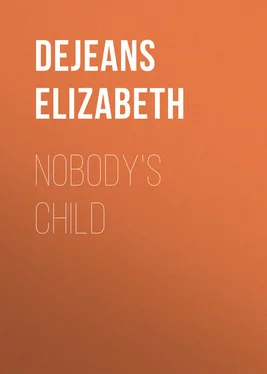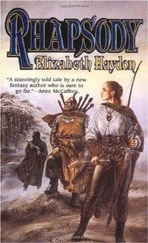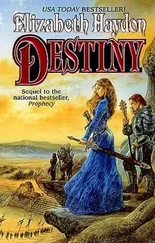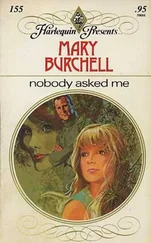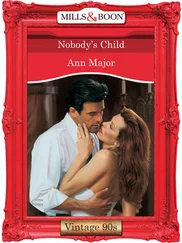Elizabeth Dejeans - Nobody's Child
Здесь есть возможность читать онлайн «Elizabeth Dejeans - Nobody's Child» — ознакомительный отрывок электронной книги совершенно бесплатно, а после прочтения отрывка купить полную версию. В некоторых случаях можно слушать аудио, скачать через торрент в формате fb2 и присутствует краткое содержание. Издательство: Иностранный паблик, Жанр: foreign_antique, foreign_prose, на английском языке. Описание произведения, (предисловие) а так же отзывы посетителей доступны на портале библиотеки ЛибКат.
- Название:Nobody's Child
- Автор:
- Издательство:Иностранный паблик
- Жанр:
- Год:неизвестен
- ISBN:нет данных
- Рейтинг книги:3 / 5. Голосов: 1
-
Избранное:Добавить в избранное
- Отзывы:
-
Ваша оценка:
- 60
- 1
- 2
- 3
- 4
- 5
Nobody's Child: краткое содержание, описание и аннотация
Предлагаем к чтению аннотацию, описание, краткое содержание или предисловие (зависит от того, что написал сам автор книги «Nobody's Child»). Если вы не нашли необходимую информацию о книге — напишите в комментариях, мы постараемся отыскать её.
Nobody's Child — читать онлайн ознакомительный отрывок
Ниже представлен текст книги, разбитый по страницам. Система сохранения места последней прочитанной страницы, позволяет с удобством читать онлайн бесплатно книгу «Nobody's Child», без необходимости каждый раз заново искать на чём Вы остановились. Поставьте закладку, и сможете в любой момент перейти на страницу, на которой закончили чтение.
Интервал:
Закладка:
Through the few intervening trees Ann could see the Penniman barn, a low wide structure with a basement for housing cattle, an arrangement that the sharply sloping ground made possible. The house, a little to the left and beyond, even in winter was obscured by trees. Two tall Lombardy poplars guarded the kitchen entrance and the woodshed, towering high above a steep-pitched roof and the alanthus and locust trees that in summer shaded it. The woods through which Ann had just passed semicircled the upward sloping field that lay between her and the farm buildings. To the right, the slope was crested by an orchard, and to the left, stretching from the house like a long line of melancholy sentinels, was a double row of magnificent cedars, guarding the road that led straight across open country, past the Hunt Club and to the Post-Road. That was the way by which Ann should have come had not the hint of spring tempted her to take the Back Road, through the pastures and the woods.
There was no one in sight. In the bit of marsh made by a spread of the creek several pigs were wallowing, as if glad to find the ground soft, and in the enclosure behind the barn a horse and three cows stood in the sun amid a clutter of chickens. Beyond the marsh, under a group of weeping-willows, was the spring and the usual accompaniment, a spring-house. Ann had expected to see her aunt's red shawl either at the spring or on the path that led up between the double row of grapevines, a full three hundred yards of upward toil to the kitchen door, for it was the hour for carrying the day's supply of water. But there was no one in view, not even her grandfather moving feebly about the barn.
Ann took up the reins with a sigh, and drove on. She always sighed when she approached her home, and tingled with the sensation of embarking on an adventure when she left it, for Ann possessed in abundance the attributes of youth: faith, hope, imagination and the capacity to enjoy intensely. Home meant work, work, work, and few smiles to sweeten the grind. But for her Aunt Sue, the smoldering rebellion the farm had bred in Ann would have flared dangerously. As long as she had been too young to understand, and had had the fields and the woods, it had not mattered so much. In a vague way, Ann had always felt that she was nobody's child, a nonentity to her grandfather except when her high spirits, tinged always by coquetry, and her inflammable temper aroused in him a sullen anger. And Ann knew that to her aunt she was more a duty than a joy; Sue Penniman appeared to have an enormous capacity for duty and a small capacity for affection. But, with the necessity to cling to something, Ann clung to her aunt. For Sue she worked uncomplainingly. For Sue's sake she hid her resentment at being a nonentity.
For in the last year of rapid awakening Ann had realized that she had never been permitted an actual share in the narrow grinding interests of the family, though, of necessity, she was tied fast to the monotonous round and, together with her grandfather and aunt, lay between the upper and nether millstones. The clannish pride that lay in every Penniman lay in her also, and yet, Ann had felt, vaguely as a child and poignantly as she grew older, that she was of them and yet not of them. Her grandfather, even her aunt had made her feel it – and above all the father who had forsaken her when she was barely old enough to remember him. Ann never thought of her father without an ache in her throat that made it impossible for her to talk of him.
At the barn Ann hitched the horse. Her grandfather might want the buggy; it was best not to unharness until she knew. She took the bundles of groceries and went on to the house, past the basement door, to the stairs that led up to the kitchen, for the house, like the barn, was built on the slope, its front resting on the crown of the slope, its rear a story from the ground, permitting a basement room and a forward cellar that burrowed deep into the ground.
Ann had glanced into the basement, but her aunt was not there. The kitchen, an ancient-looking room, whitewashed and with small square-paned windows, was also empty. Ann put down her parcels and went into the living-room. It and the kitchen and the two rooms above were all that remained of the colonial house that antedated even Westmore. It was low-ceilinged, thick-walled, and casement-windowed, and had a fireplace spacious enough to seat a family. Built of English brick brought to the colony two centuries before, the old chimney had withstood time and gaped deep and wide and soot-blackened. This room had been one wing of the colonial mansion, and, because of the solid masonry that enclosed the cellar beneath it, had not fallen into decay like the rest of the house.
But it had not been built by a Penniman. A hundred years before, a Penniman, "a man of no family, but with money in his pocket," had bought the house and the land "appertaining" from an encumbered Westmore, and had become father of the Pennimans now scattered through three counties. The first Penniman and his son's son after him had been tobacco growers on a small scale and slave owners, but they had never been of the aristocracy.
It was Ann's grandfather who, some thirty years before, ten years after the war, had torn down the other two wings of the old house and had built the porch and plain two-storied front that now sat chin on the crown of the slope and looked out over terraces whose antiquity scorned its brief thirty years; looked over and beyond them, to miles of rolling country. The narrow, back-breaking stairs that led from the living-room to the rooms above, a back-stairs in colonial days, was now the main stairway. The mansion had become a farmhouse, for the first Penniman had been the only Penniman "with money in his pocket."
There was no one in the living-room, and Ann paused to listen, then climbed the stairs, coming up into a narrow passageway, at one end of which were three steps. They led to the front bedrooms, her grandfather's addition to the old house. One room was his, the other had been Coats Penniman's room, Ann's father's room. Like many of the Pennimans, Ann's mother had married her first cousin, a boy who had grown up in her father's house.
The stir Ann had heard was in this room, which, except when it had accommodated an occasional visiting Penniman, had been closed for fourteen years. The door stood wide now, the windows were open, and her aunt was making the bed.
Ann stopped on the threshold, held by surprise. She had not known of any expected visitor. For the last six years they had been too poor and too proud to entertain even a Penniman. And there was something in her aunt's manner and appearance that arrested Ann's attention. Sue Penniman was always pale, Ann could easily remember the few times when she had seen color in her aunt's cheeks, and, though she always worked steadily, it was without energy or enthusiasm. But there was color in her cheeks now, and eagerness in her movements. She was thin and her shoulders a little rounded from hard work, but now, when she lifted to look at Ann, she stood very erect and the unwonted color in her face and the brightness in her blue eyes made her almost pretty.
"Is some one comin', Aunt Sue?" Ann asked.
Her aunt did not answer at once. She looked at Ann steadily, long enough for a quiver of feeling to cross her face. Then she came around the bed, came close enough to Ann to put her hands on Ann's shoulders.
"Cousin Coats is comin', Ann," she said, her nasal drawl softened almost to huskiness.
Her father coming! The color of sudden and intense emotion swept into Ann's face, widening her eyes and parting her lips, a lift of joy and of craving combined that stifled her. It was a full moment before Ann could speak. Then she asked, "When – ?"
"Sunday – to-morrow."
"When did you know?" Ann was quite white now.
Читать дальшеИнтервал:
Закладка:
Похожие книги на «Nobody's Child»
Представляем Вашему вниманию похожие книги на «Nobody's Child» списком для выбора. Мы отобрали схожую по названию и смыслу литературу в надежде предоставить читателям больше вариантов отыскать новые, интересные, ещё непрочитанные произведения.
Обсуждение, отзывы о книге «Nobody's Child» и просто собственные мнения читателей. Оставьте ваши комментарии, напишите, что Вы думаете о произведении, его смысле или главных героях. Укажите что конкретно понравилось, а что нет, и почему Вы так считаете.
